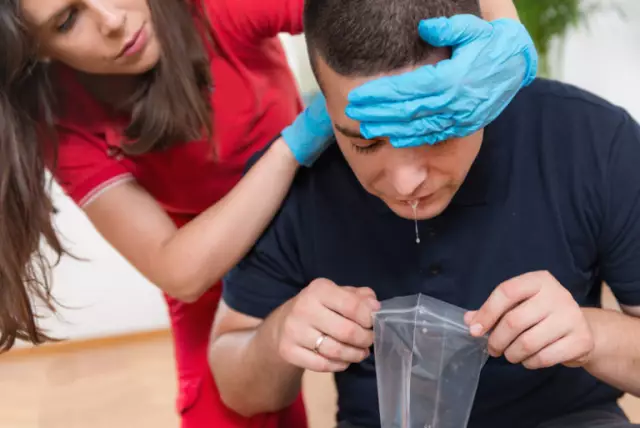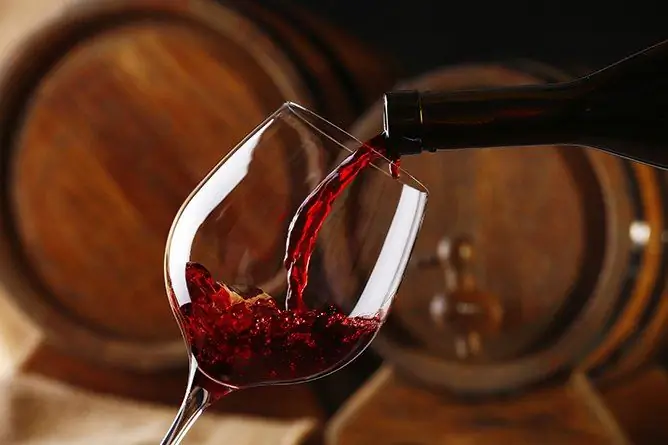- Author Rachel Wainwright [email protected].
- Public 2023-12-15 07:39.
- Last modified 2025-11-02 20:14.
Wine poisoning
Wine is a popular medium-strength alcoholic drink (anhydrous alcohol content up to 16% in natural wines and up to 22% in fortified wines), obtained by fermenting grape juice. There are also fruit and berry wines, however, by default, wine is understood as grape.

Source: depositphotos.com
In the production of classic noble wines, it is forbidden to introduce into the recipe components that improve or soften the taste of the drink, dilute the wine material with alcohol or water. If this happens, the final product is categorized as wine drinks.
On sale you can find the so-called powder or artificial wine, obtained by mixing in certain proportions of flavorings, colors, sweeteners, wine concentrate and alcohol. This product is called “special wine”.
The shelf life of natural wine is theoretically unlimited, however, a number of factors can affect its quality and even make it toxic.
Drinking a wine drink or special wine after the expiration date is highly undesirable, since it can easily lead to food poisoning.
How does wine poisoning happen?
Poisoning with wine or wine drink is possible in several cases:
- expired shelf life;
- violation of storage standards for finished products or wine materials used to prepare a drink;
- home production with disrupted technology;
- surrogate drink.
Expiration dates are relevant not only for synthetic wines and wine drinks, but also for classic wines. The standard warranty period, regulated by law, is 12-24 months. Long shelf life (up to several decades) is possible if a number of conditions are met: a certain position of the bottle, humidity, stable temperature and lighting level in the store.
In an open bottle, wine is stored for no more than 3-5 days, after which its vinegar sourness begins.
Damage to wine is possible due to improper storage and transportation: violation of the tightness of the packaging, exposure to direct sunlight, high ambient temperature, packing in metal or plastic containers.
In home wine production, poisoning often occurs due to a violation of the recipe, which leads to an increased multiplication of pathogenic microorganisms in the drink. Also, when drinking homemade wine, you can get poisoned by the salts of hydrocyanic acid contained in the seeds of berries and fruits on which it is infused.
The most severe poisoning, often fatal, develops when using surrogates based on methyl, butyl and other alcohols that are not intended for use in the food industry. Such drinks, as a rule, are produced in an artisanal way and are sold "by hand" or on spontaneous trading platforms.
Poisoning symptoms
When poisoning with wine, it is noted:
- nausea, vomiting;
- increased salivation;
- pain in the abdomen;
- liquid multiple stools;
- unsatisfactory general health;
- headache, dizziness;
- increased body temperature;
- drowsiness, severe weakness.
The severity of the symptoms varies depending on the quantity and quality of the drink taken.
In addition to food poisoning, alcohol poisoning is possible when drinking wine and wine drinks, which will have similar symptoms. A distinctive feature in this case is the presence of intoxication and symptoms of involvement in the pathological process of the central nervous system (disorientation, discoordination, changes in the intellectual and emotional spheres).
For poisoning with surrogate wine products made on the basis of methyl alcohol, in addition to the symptoms of food poisoning, pathological intoxication is characteristic that does not correspond to the dose of alcohol consumed, and visual impairment.

Source: depositphotos.com
First aid for wine poisoning
- Gastric lavage, for which it is necessary to drink a large amount (0.5-1.5 liters) of warm water or a weak solution of potassium permanganate and provoke an emetic urge by pressing on the root of the tongue. Repeat the procedure several times until clean wash water.
- Reception of enterosorbents (Smecta, Polysorb MP, Enterosgel, Polyphepan, etc.).
- Taking saline laxatives (magnesium sulfate) - only if there is no diarrhea.
- Oral rehydration with intense repeated vomiting to replenish lost fluid: a tablespoon of saline solution (Rehydron, Hydrovit) or salt-free solution (tea, water, rice water) every few minutes, on average up to 1.5 liters per hour.
When is medical attention required?
Qualified help is needed if, against the background of ongoing activities, the condition worsens or there is no positive dynamics.
It is necessary to call the ambulance team in case of:
- indomitable vomiting;
- the appearance of blood in the stool or vomit;
- dehydration (dry skin, general weakness, thirst, concentrated urine with a pungent odor, dizziness, etc.);
- persistent increase in body temperature;
- the appearance of neurological symptoms.
In case of methyl alcohol poisoning, hospitalization is necessary in any case.
Treatment consists in conducting detoxification measures and symptomatic therapy aimed at maintaining the functions of vital organs and alleviating the condition of the victim.
Possible consequences
With mild poisoning, the symptoms are stopped for 2-3 days, the state of health is completely normalized. In severe poisoning, the manifestations of dyspeptic and intoxication syndromes persist for 3-5 days, acute lesions of various organs are possible.
Poisoning with wine and wine drinks can be complicated by acute pancreatitis, cholecystitis, nephritis.
The consequence of dyspeptic disorders can be dehydration of the body, electrolyte imbalance. In rare cases, death is possible.
The use of methyl alcohol can lead to loss of vision, alcohol coma and death.
Prevention
To prevent poisoning, you must refrain from taking drinks with an expired, unreasonably low cost, purchased outside specialized retail chains.
You should not consume products that have the following symptoms:
- leaky (dry or wet) cork;
- drips on the bottle;
- Pungent vinegar odor or intense synthetic fruity aroma
- foaming when spilled;
- extraneous inclusions;
- turbidity, suspension or sediment.
YouTube video related to the article:

Olesya Smolnyakova Therapy, clinical pharmacology and pharmacotherapy About the author
Education: higher, 2004 (GOU VPO "Kursk State Medical University"), specialty "General Medicine", qualification "Doctor". 2008-2012 - Postgraduate student of the Department of Clinical Pharmacology, KSMU, Candidate of Medical Sciences (2013, specialty "Pharmacology, Clinical Pharmacology"). 2014-2015 - professional retraining, specialty "Management in education", FSBEI HPE "KSU".
The information is generalized and provided for informational purposes only. At the first sign of illness, see your doctor. Self-medication is hazardous to health!






